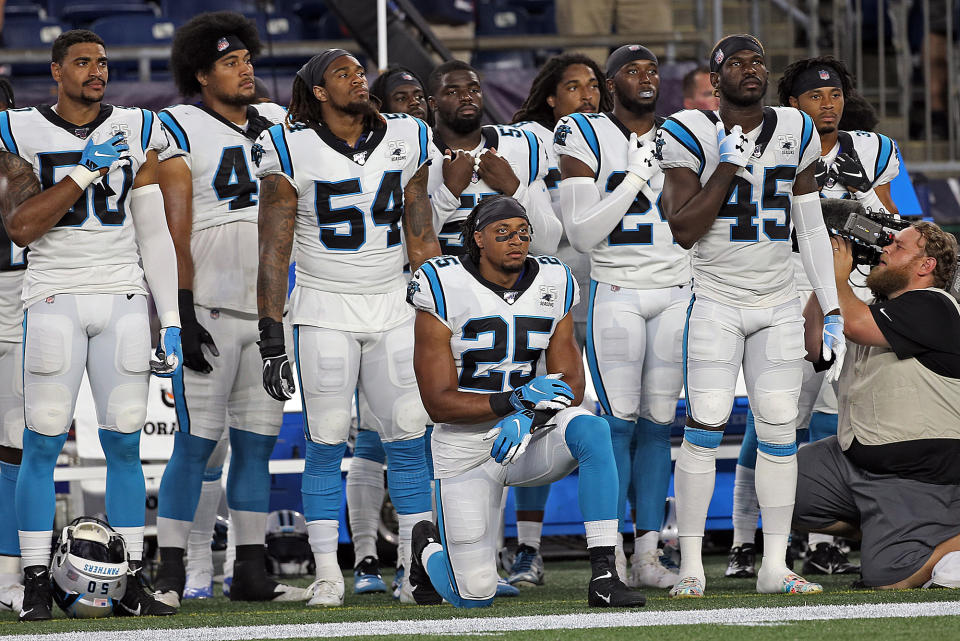Poll: Most Americans fine with players protesting, speaking out
As the NFL prepares to raise the curtain on a season that promises to be unprecedented in so many ways, a new Washington Post poll reveals some striking changes on Americans’ attitudes about players’ rights to protest and speak out on social issues.
A majority of Americans, 56 percent, now believe it is appropriate for athletes to kneel during the national anthem as a form of protest; while 42 percent disagree. An even larger majority, 62 percent, believes athletes have the right to express themselves on social and national issues.
Self-described football fans break down along similar lines; 59 percent believe kneeling during the anthem is acceptable, while 64 percent are fine with athletes speaking their minds on social issues. (The telephone poll of 1,001 adults was conducted Sept. 1-6, and has a margin of error of +/- 3.5 points.)
Like every other facet of this now-politically-weaponized NFL season, this poll will be embraced by those who agree with its conclusions. Those who disagree with the poll’s findings will brush it off with some combination of disregarding the source, the methodology or the entire concept of polls in general. Both sides will wait for this weekend’s TV ratings to come in, and spin whatever data arrives to fit their own preconceived conclusions.
It’s worth noting, in that context, that even a 42 percent minority is still a substantial percentage of the American public. If 42 percent of the viewing public — or even 4.2 percent — decided not to tune into NFL games any longer for political reasons, that would be a catastrophic blow to a league already reeling from the pandemic. So fans of the right to protest might not want to do any celebratory victory laps just yet.
On a larger scale, though, this poll shows how attitudes change as times do. A 2016 Yahoo/YouGov poll found 47 percent opposed to the kneeling protest of Colin Kaepernick and 32 percent in support. A 2020 poll found that support had increased to 52 percent, while opposition had dropped to 36 percent.
The changing polls are reflective of larger societal trends. This past summer’s protests weren’t just confined to traditionally progressive sections of America; they reached deep into the heart of suburbia, where lower-case C conservatism is the prevailing ethos. That’s indicative of widespread acceptance of change.
The poll reveals this shift in its second question: whether athletes should use their platform to express social views — that is, not just “shut up and dribble.” Older Americans wish their athletes would just stick to sports; only 45 percent want to hear from athletes on social issues. But a full 70 percent of Americans under 50 are fine with athletes being spokespeople for larger causes.
Sports leagues and sponsors have taken notice of which way the wind’s blowing. It’s why the NBA has plastered social justice slogans all over its courts and its players’ backs; it’s why even traditionally hardcore conservative sports like NASCAR have let progressive messages slip into their conversations.
For people long accustomed to the separation of sports and politics, the last few years have seemed a dizzying shuffle as the world realigns. But the easy comparison here is musical taste. Most people’s musical tastes are formed when they’re in high school, and nothing that comes afterward ever quite measures up. (Admit it: you think music was better when you were younger, right?) The tendency is to dismiss younger generations’ music as terrible — while at the same time disregarding older generations that criticized our music the same way. The same philosophy applies with political perspective.
Granted, most people tend to grow more conservative in their political views as they grow older. But when you’re now starting from a worldview so supportive of diverse viewpoints, even a little slide right will still result in a sports environment far more political than in years past. This isn’t a “good” or “bad” thing per se; it’s a matter of whether each fan is willing to accept the greater tidal drifts of sports and society.
The only constant in life is change. Time progresses. Society rolls on down the tracks. The NFL has made the decision to roll on with it. At some point, we all make a choice, to stay on the train or get off. But when we make that choice, we can't really complain when the train keeps on going without us.

_____
Jay Busbee is a writer for Yahoo Sports. Follow him on Twitter at @jaybusbee or contact him with tips and story ideas at jay.busbee@yahoo.com.
More from Yahoo Sports:

 Yahoo Sports
Yahoo Sports 